News Analysis
An article about the upcoming movie remake, “The Lion King,” has claimed that the film contains messages of white supremacy and fascism.
The article, published on July 10 in The Washington Post, is not labeled as a review of the movie, and it’s not clear whether or not the author, Dan Hassler-Forest, even saw it. The only scene he describes as he delves into all kinds of “Nazi,” “racist,” and “anti-Semitic” imagery that he claims is in the movie, is the scene depicted in the 93-second trailer that he mentions at the start of the article.
“As we watch the herbivores congregate to bow down before their newborn ruler, ‘The Lion King’ presents a seductive worldview in which absolute power goes unquestioned and the weak and the vulnerable are fundamentally inferior,” Hassler-Forest writes. “In other words: ‘The Lion King’ offers us fascist ideology writ large, and there is no obvious way out for the remake.”
It is possible that Hassler-Forest saw the 1994 version of the film, although he doesn’t explicitly say. However, the new film has been noted—and criticized—for being remarkably close to its source material, even for a remake, so it would appear he is criticizing the original story for imprinting what he calls a “white supremacist worldview” upon the animal kingdom.
Hassler-Forest lives in the Netherlands and works at the country’s Utrecht University, in the Media Studies department. Previous articles he has written for The Washington Post include “‘Solo’ gets one thing right: The droids in ‘Star Wars’ are basically slaves” and “The Avengers are the heroes of ‘Endgame,’ but Disney was the villain all along.”
Hassler-Forest’s list of articles for the Los Angeles Review of Books invoke similar imagery, with titles like “Politicizing Star Wars: Anti-Fascism vs. Nostalgia in ‘Rogue One,’” and “The Politics of the Planet of the Apes.”
The author sees the “Lion King,” and the other movies he mentions in the article for comparison, as “mapping our own social hierarchies onto the pristine and ‘neutral’ animal kingdom.”
Through statements like this he displays a rigid interpretation of these stories through a narrow Marxist lens.
The author, of course, doesn’t forget to squeeze the almost obligatory reference to President Donald Trump into his interpretation of the movie.
“Doubling down on Disney’s historical obsession with patriarchal monarchies, it places the audience’s point of view squarely with the autocratic lions, whose Pride Rock literally looks down upon all of society’s weaker groups—a kind of Trump Tower of the African savanna.”
Hassler-Forest breaks down what he decides is the “class structure” the movie takes from human society, adding in his own interpretation of who the villains are supposed to represent, creating the necessary oppressed class the Marxist worldview requires.
“With the lions standing in for the ruling class, and the ‘good’ herbivores embodying society’s decent, law-abiding citizens, the hyenas transparently represent the black, brown and disabled bodies that are forcefully excluded from this hierarchical society.”
“Just as fascist leaders constantly pinpoint specific groups to vilify and cast out from their view of a ‘balanced’ society,” Hassler-Forest writes, “the film’s heroes are preoccupied with keeping their kingdom free of contamination by undesirable characters, who are consigned to the shadowy ghettolike areas ‘beyond our borders’—on the wrong side of the tracks.”
Hassler-Forest wrote that even the film’s majority-black cast of actors that provide the voices for the characters is not enough to keep the film from betraying what the author sees as a depiction of white supremacy, Nazism, and fascism.
Hassler-Forest goes on to project all that he feels are the ills of the current society onto a movie he accuses of celebrating “the strong, the beautiful and the powerful.”
“At a moment when the far right is on the rise, when we debate whether to call the horrific shelters on our border concentration camps, and when anti-Semitic and Islamophobic hate crimes continue to increase, we should ask ourselves what it means to obsessively revisit narratives that celebrate the strong, the beautiful and the powerful, while looking down upon the rebels, the outcasts and the powerless.”
If someone were to see this movie after having read Hassler-Forest’s article, they could also take this simple remake of a Disney classic as something more than it is—a coming-of-age tale of loss, betrayal, and redemption—skewing their enjoyment of a story that has been around without controversy for decades.
Hassler-Forest posted a link to the article on Twitter, joking, “Because I’m a horrible person who’s incapable of experiencing joy, I wrote this @washingtonpost article on why #TheLionKing presents a worldview that is fundamentally and irreducibly fascist.”
Because I’m a horrible person who’s incapable of experiencing joy, I wrote this @washingtonpost article on why #TheLionKing presents a worldview that is fundamentally and irreducibly fascist. https://t.co/7qmvV2wYIe
— Dan Hassler-Forest (@DanHF) July 10, 2019
Views expressed in this article are the opinions of the author and do not necessarily reflect the views of NTD.com


